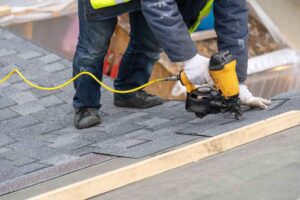Residential Roofing Replacement: What You Need to Know
Replacing your home’s roof is a time-consuming and expensive process but it is also one of the most important steps you can take to protect yourself from any future damage. It’s an investment that not only protects your home but adds value as well. In this guide, we will provide you with all of the important information necessary to make sure that your new residential roofing system lasts for years without hassle or problems. By the end of this post, you should have all the knowledge necessary on residential roofing replacement – so let’s get started!

Overview of residential roof replacement – types of roofs and why it’s important
Residential roof replacement is a crucial project that homeowners should consider when their roofs need repair or replacement. There are different types of roofs available in the market, such as asphalt shingles, metal roofs, clay tiles, and many more. Each of these options has its own advantages and disadvantages, depending on the climate, budget, and personal preferences of the homeowner. However, the importance of roof replacement goes beyond aesthetic and functional factors. A new and sturdy roof provides protection against weather and structural damage, ensures energy efficiency and security, and increases the overall value of a home.
Evaluating your current roof’s condition to determine if replacement is needed
As a homeowner, evaluating the condition of your roof is vital to ensuring the safety and security of your family and property. While it may seem daunting, there are a few key factors to consider. Firstly, assess the age of your roof. Most roofing materials have an expected lifespan, and if your roof has exceeded this, it may be time for a replacement. Inspect your roof for signs of damage such as leaks, missing or damaged shingles, or cracked tiles. These can all indicate a problem that requires prompt attention. Finally, consider recent weather events or natural disasters that may have impacted your roof’s condition.
Exploring alternative solutions for minor repairs or upgrades, such as shingle repair or a new coating
As a homeowner, making small repairs or upgrades to your property can become a hassle. Fortunately, there are alternative solutions available that can save you time and money. For example, if you notice a few damaged shingles on your roof, instead of immediately replacing the entire roof, consider repairing only the damaged shingles. Additionally, instead of repainting your roof, consider applying a new coating to give it a fresh, updated look. By exploring alternative solutions for these minor repairs, you can maintain the integrity of your property without breaking the bank.
Researching local contractors and understanding what type of warranty they offer
When it comes to choosing a local contractor for roofing services, it’s important to do your research and understand the type of warranty they offer. A professional contractor should have a warranty that not only protects their workmanship but also covers any necessary materials or products used in the project. It’s crucial to read through the details of the warranty and ask any questions you may have before agreeing to work with a contractor. By taking the time to research and fully understand the warranty offered, you can have peace of mind knowing that your project is in good hands with a reliable contractor.
Preparing your home and budgeting for the cost of a complete roof replacement
When it comes to preparing your home for a complete roof replacement, it’s important to take a professional and strategic approach. Start by doing your research to find a reputable roofing company that can provide you with a detailed estimate of the costs involved. From there, you should work on budgeting for the project, taking into account the materials, labor, and any other expenses that may arise. It’s also important to consider the timing of the project, as certain times of year may be better for roof replacements than others.
When it comes to residential roof replacement, there is much to consider before making a final decision. Consider the age of your roof and its current state, explore alternative solutions for minor repairs or upgrades, evaluate local contractors and understand the warranties they provide, budget for an entire roof replacement, and take the necessary steps during installation to ensure that the job is done correctly. Regardless of what you ultimately decide in terms of whether to replace or repair an existing roof, understanding the basics of residential roof replacement is essential for any homeowner looking to make a well-informed choice about their home’s future.







